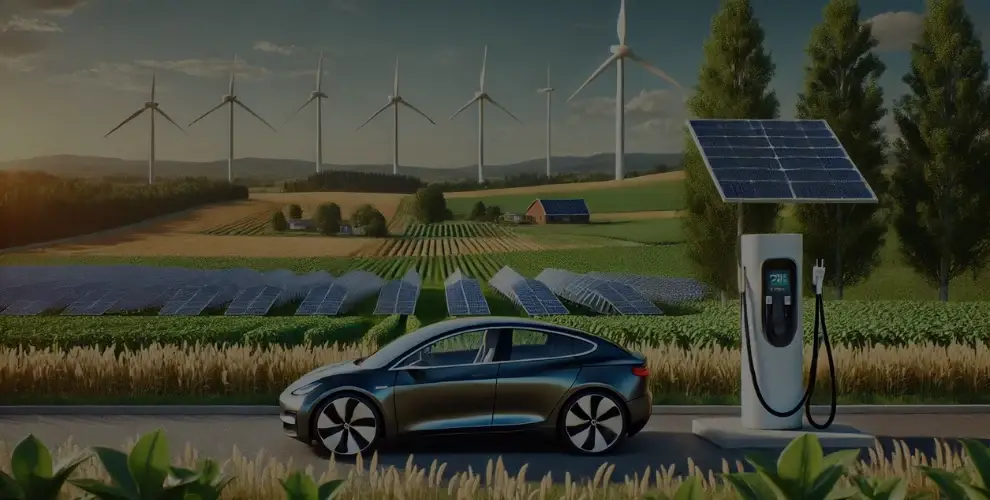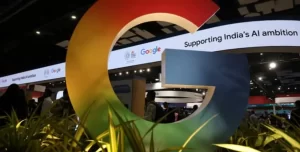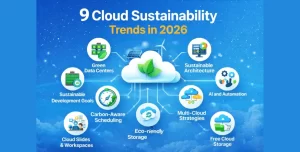
Top Sustainable Energy Technologies for Businesses in 2024
Table of Contents
Introduction
Welcome to WikiGlitz!
In this blog, we have brought you an amazing guide on the top sustainable energy technologies for businesses in 2024.
As companies worldwide focus on reducing their carbon footprint and cutting energy costs, sustainable energy solutions are becoming critical for business success.
By adopting the latest energy technologies, businesses can not only meet their energy needs but also play a pivotal role in promoting environmental sustainability.
In this blog, we’ll explore the latest innovations, their applications, and how businesses can benefit from them in 2024 and beyond.
Key Takeaways:
- Businesses can reduce energy costs and improve sustainability by adopting clean energy technologies.
- Energy storage technologies are essential for ensuring grid stability and efficient energy use.
- Investing in sustainable energy solutions has both long-term financial and environmental benefits for businesses.
What Are the Best Energy Technologies for Businesses in 2024?
Sustainable energy technologies for businesses have evolved significantly, offering numerous solutions for reducing carbon emissions and energy costs.
From solar and wind power to advanced energy storage systems, companies can leverage a variety of options. In 2024, businesses should focus on adopting:
- Solar Energy Systems: Solar energy remains one of the most popular options, especially for businesses looking to reduce long-term electricity costs. Systems like solar panels paired with energy storage technologies ensure uninterrupted power even when the sun isn’t shining. The best home solar energy systems for off-grid living can also be adapted for business use, offering independence from the grid.
- Wind Power: Wind energy is another viable option for companies, especially those in windy regions. With advancements in turbine technology, businesses can generate clean energy on-site, lowering their dependence on traditional power sources.
- Energy Storage Solutions: A key challenge with renewable energy is its intermittent nature, which can cause instability in the power grid. To combat this, businesses can
- invest in the most cost-effective energy storage solutions available today. These systems store excess energy generated from renewable sources, ensuring a reliable energy supply even during peak demand periods or when natural resources are unavailable.
How Do Renewable Energy Technologies Work?
Renewable energy technologies work by harnessing natural resources like sunlight, wind, and water to generate electricity. Unlike fossil fuels, which emit greenhouse gases, renewable energy sources produce clean, sustainable power.
For example:
- Solar Panels capture sunlight and convert it into electrical energy using photovoltaic cells.
- Wind turbines harness the power of the wind’s movement to produce energy.
- Hydropower captures the energy from flowing water to produce electricity.
These technologies are not only effective for businesses but are also scalable to meet larger energy demands.
What Are the Latest Advancements in Clean Energy Technologies in 2024?
The latest advancements in clean energy technologies in 2024 focus on improving efficiency, reducing costs, and integrating smarter systems. Innovations include:
- Floating Solar Farms: These are large-scale solar arrays built on water bodies, helping businesses in land-scarce regions harness solar power.
- Advanced Wind Turbines: These new designs can capture more wind at lower speeds, making wind energy viable in a broader range of locations.
- Energy Management Systems: Businesses can now monitor and optimize their energy use with AI-powered systems that track energy consumption and suggest efficiency improvements in real-time.
These cutting-edge technologies allow businesses to further reduce their environmental impact while maximizing energy savings.
How Do Energy-Efficient Technologies Help Reduce Carbon Footprints?
Energy-efficient technologies play a crucial role in reducing the carbon footprint of businesses. By improving how energy is used, these technologies lower the amount of energy needed to perform the same tasks. For example:
- LED lighting is a great choice because it can save you up to 80% on energy compared to old incandescent bulbs.
- Energy-efficient HVAC Systems reduce heating and cooling costs, which can account for a significant portion of a business’s energy usage.
These technologies not only help businesses meet environmental targets but also reduce energy costs over time, making them a win-win solution.
What Are the Different Types of Energy Storage Technologies Explained?
Energy storage is crucial for businesses that rely on renewable energy sources. The different types of energy storage technologies include:
- Lithium-Ion Batteries: These are the most common and are used in both small-scale systems and large commercial energy grids. They provide high efficiency and are ideal for businesses that need backup energy.
- Flow Batteries: These are a promising technology for long-duration energy storage. They allow businesses to store energy for extended periods and are scalable to meet larger energy demands.
- Pumped Hydroelectric Storage: This system uses excess electricity to pump water uphill, storing energy as potential energy. When electricity demand rises, the water is released to generate power.
How Are Energy Storage Technologies Evolving?
Energy storage technologies have made tremendous advancements in the last few years. Modern systems are more efficient, reliable, and scalable than ever before. In 2024, we see innovations like:
- Solid-State Batteries: Providing more energy in less space and being safer than regular lithium-ion batteries.
- Hybrid Storage Systems: These combine different storage technologies to balance short-term and long-term energy needs, ensuring a more stable energy supply and cost savings.
These evolving storage solutions are helping businesses efficiently manage their energy usage while ensuring grid stability.
What Is the Overview of Clean Energy Technologies for Businesses?
Clean energy technologies provide businesses with several sustainable options to meet their energy needs. The overview of clean energy technologies includes:
- Solar Power: A reliable, scalable option for businesses in both urban and rural areas.
- Wind Energy: Best suited for businesses in windy locations, offering long-term energy savings.
- Hydropower: Ideal for companies near water bodies, providing continuous energy.
Businesses that adopt these technologies benefit from reduced energy costs, government incentives, and improved public perception as they contribute to global sustainability goals.
What Are the Benefits of Different Types of Renewable Energy Sources?
The types of renewable energy sources offer distinct benefits:
- Solar Energy: Works well in both small and large installations, with decreasing costs due to technological advancements.
- Wind Energy: Can generate significant amounts of energy for businesses located in suitable geographic areas.
- Geothermal Energy: Ideal for businesses in volcanic regions, providing a constant, reliable energy source.
Each of these options offers specific benefits depending on the geographic location and energy needs of the business.
How Do Energy Storage Technologies Impact Grid Stability?
The integration of energy storage technologies is crucial for maintaining grid stability, especially as businesses shift toward renewable energy. These systems ensure that:
- Excess energy is stored during low-demand periods and used during peak times.
- Uninterrupted power supply is provided even when renewable sources like solar or wind are not generating energy.
This ensures that businesses experience fewer disruptions and can better manage their energy consumption.
What Are the Most Cost-Effective Energy Storage Solutions for Businesses?
The most cost-effective energy storage solutions for businesses depend on factors like energy needs, location, and budget. Currently, the most popular options include:
- Lithium-Ion Batteries: Ideal for businesses with medium energy demands.
- Flow Batteries: Cost-effective for large-scale, long-duration storage.
- Thermal Storage: A great option for businesses with significant heating or cooling needs.
These systems help businesses store energy efficiently, reduce dependency on the grid, and cut energy costs in the long run.
Conclusion
We’ve explored some of the best sustainable energy technologies that businesses can adopt in 2024.
From renewable energy technologies like solar and wind power to advanced energy storage systems, the future of business energy solutions is bright and sustainable.
Investing in these technologies not only ensures operational efficiency but also enhances a company’s commitment to reducing its carbon footprint.
Make the shift today and enjoy the long-term benefits of clean energy!
Follow WikiGlitz for more insights into the latest energy technologies and sustainability trends!
FAQ:
1. How do renewable energy technologies work?
Renewable energy technologies convert natural resources like sunlight, wind, and water into electricity, providing a sustainable energy source.
2. What are the latest advancements in clean energy technologies in 2024?
The latest advancements include floating solar farms, advanced wind turbines, and AI-powered energy management systems for improved efficiency.
3. What are the most cost-effective energy storage solutions for businesses?
Lithium-ion batteries, flow batteries, and thermal storage systems are among the most cost-effective options for businesses seeking energy independence.
4. How can energy-efficient technologies help businesses reduce costs?
Energy-efficient technologies like LED lighting and advanced HVAC systems reduce energy consumption, leading to significant cost savings over time.
5. What are the key benefits of adopting renewable energy technologies for businesses?
Adopting renewable energy technologies helps businesses lower energy costs, reduce their carbon footprint, and improve their brand’s sustainability image.
Want to keep up with our blog?
Our most valuable tips right inside your inbox, once per month.
Error: Contact form not found.
WikiGlitz Team
Welcome to WikiGlitz, your ultimate destination for tech insights and innovation. Our expert team is dedicated to delivering free resources and professional advice on various technology topics, including Artificial Intelligence, Cyber Security, Cloud Computing, and more. We strive to empower our readers with up-to-date information and practical guidance, ensuring you stay ahead in the rapidly evolving tech landscape. At WikiGlitz, we are passionate about making complex technology accessible to everyone. Our team of seasoned experts curates content that is both informative and engaging, helping you understand and leverage the latest tech trends. Whether you're a tech enthusiast or a professional, WikiGlitz is your go-to source for reliable, expert-driven content. Join us on this journey to explore and embrace the future of technology.





